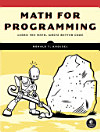The Art of Randomness: Randomized Algorithms in the Real World
Mar 2024 · No Starch Press
Ebook
400
Pages
family_home
Eligible
info
reportRatings and reviews aren’t verified Learn More
About this ebook
Harness the power of randomness (and Python code) to solve real-world problems in fun, hands-on experiments—from simulating evolution to encrypting messages to making machine-learning algorithms!
The Art of Randomness is a hands-on guide to mastering the many ways you can use randomized algorithms to solve real programming and scientific problems. You’ll learn how to use randomness to run simulations, hide information, design experiments, and even create art and music. All you need is some Python, basic high school math, and a roll of the dice.
Author Ronald T. Kneusel focuses on helping you build your intuition so that you’ll know when and how to use random processes to get things done. You’ll develop a randomness engine (a Python class that supplies random values from your chosen source), then explore how to leverage randomness to:
Scientific anecdotes and code examples throughout illustrate how randomness plays into areas like optimization, machine learning, and audio signals. End-of-chapter exercises encourage further exploration.
Whether you’re a programmer, scientist, engineer, mathematician, or artist, you’ll find The Art of Randomness to be your ticket to discovering the hidden power of applied randomness and the ways it can transform your approach to solving problems, from the technical to the artistic.
The Art of Randomness is a hands-on guide to mastering the many ways you can use randomized algorithms to solve real programming and scientific problems. You’ll learn how to use randomness to run simulations, hide information, design experiments, and even create art and music. All you need is some Python, basic high school math, and a roll of the dice.
Author Ronald T. Kneusel focuses on helping you build your intuition so that you’ll know when and how to use random processes to get things done. You’ll develop a randomness engine (a Python class that supplies random values from your chosen source), then explore how to leverage randomness to:
- Simulate Darwinian evolution and optimize with swarm-based search algorithms
- Design scientific experiments to produce more meaningful results by making them truly random
- Implement machine learning algorithms like neural networks and random forests
- Use Markov Chain Monte Carlo methods to sample from complex distributions
- Hide information in audio files and images, generate art, and create music
- Reconstruct original signals and images from only randomly sampled data
Scientific anecdotes and code examples throughout illustrate how randomness plays into areas like optimization, machine learning, and audio signals. End-of-chapter exercises encourage further exploration.
Whether you’re a programmer, scientist, engineer, mathematician, or artist, you’ll find The Art of Randomness to be your ticket to discovering the hidden power of applied randomness and the ways it can transform your approach to solving problems, from the technical to the artistic.
About the author
Ronald T. Kneusel is a computer scientist, an expert in machine learning, and a lover of fine craft beers. Kneusel has been working with machine learning in industry since 2003 and completed a PhD in machine learning from the University of Colorado, Boulder, in 2016. He’s the author of four other books with No Starch Press: How AI Works (2023), Strange Code (2022), Practical Deep Learning (2021), and Math for Deep Learning (2021).
Rate this ebook
Tell us what you think.
Reading information
Smartphones and tablets
Install the Google Play Books app for Android and iPad/iPhone. It syncs automatically with your account and allows you to read online or offline wherever you are.
Laptops and computers
You can listen to audiobooks purchased on Google Play using your computer's web browser.
eReaders and other devices
To read on e-ink devices like Kobo eReaders, you'll need to download a file and transfer it to your device. Follow the detailed Help Center instructions to transfer the files to supported eReaders.







